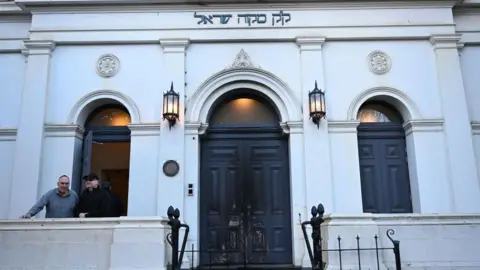In recent days, Australia has witnessed a troubling escalation of antisemitic incidents, most notably marked by an arson attack on a synagogue located in Melbourne. The Prime Minister of Australia, Anthony Albanese, has expressed his firm commitment to utilizing the “full force of law” in addressing this incident and any similar occurrences aimed at the Jewish community. This incident underscores the rising tensions within the country that can be traced back to broader geopolitical issues, notably the ongoing conflict between Israel and Hamas.
On the night of the attack, a man was spotted pouring a flammable liquid over the front door of the East Melbourne Hebrew Congregation before igniting it. Remarkably, about 20 congregants were present for a dinner at the time, yet thankfully, no injuries were reported as they were evacuated promptly. The authorities are currently on the lookout for the perpetrator and are also investigating potential links between this incident and another attack that took place on the very same night at a Jewish-owned restaurant in the city.
This incident is just one in a series of antisemitic events that have unfolded in Australia recently. Such occurrences have escalated significantly alongside the rise in tensions fueled by the Israel-Hamas conflict. The dynamics of this international situation have led to protests and unrest within Australia, manifesting through violence and vandalism targeting Jewish establishments. In light of these events, Australian authorities have sought to take decisive action. Measures include the appointment of a special envoy dedicated to combating antisemitism, and the introduction of stricter legislation aimed at curtailing hate crimes.
Prime Minister Albanese has been vocal regarding the government’s stance on antisemitism, declaring it has “no place in Australia.” He emphasized that those responsible for these horrific attacks should be subjected to the full weight of the law, ensuring that victims receive the necessary support. Following the synagogue fire, he reiterated his government’s resolve to protect the Jewish community, denouncing the troubling climate of hostility that has recently emerged.
The situation escalated further as some individuals attempted to disrupt operations at the Miznon restaurant, leading to chaos with rioters storming the venue; chairs and other items were hurled through the air amidst chants of “death to the IDF,” referencing the Israel Defense Forces. Such overt displays of violence and intimidation prompted comments from Alex Ryvchin, co-chief executive of the Executive Council of Australian Jewry, who characterized these attacks as representing a “severe escalation” against Jewish Australians.
The Australian government’s proactive approach includes broader monitoring and addressing of antisemitic rhetoric and behavior, shaped largely by recent calls from international figures, including Israel’s Foreign Minister Gideon Saar. Saar underscored the urgency for the Australian government to enhance its strategies to mitigate antisemitism, calling it a “toxic disease.”
Further complicating the matter, the political landscape within Australia has become increasingly fraught due to the simmering Middle East conflicts. The response to the incidents has sparked a wave of protests from both Jewish and Muslim communities in Australia, as well as an alarming increase in both Islamophobia and antisemitism over the past few months.
Moreover, the ongoing military action in Gaza following the tragic events of October 7, 2023—when approximately 1,200 people lost their lives and 251 were taken hostage—has led to a significant humanitarian crisis, with reports claiming that at least 57,268 people have died in Gaza since then. These figures frame the backdrop against which these domestic issues of antisemitism, hate crimes, and community unrest are unfolding, providing a complex context for understanding social anxieties in Australia today.
In conclusion, as Australia grapples with the implications of international conflicts on local attitudes and actions, the government’s efforts to combat antisemitism will be crucial. The recent events serve as a stark reminder of the need for vigilance, coherence in policy responses, and community solidarity in the face of escalating tensions.











